“I was looking out the window, waiting for words that did not come,” says Rebecca Norris Webb of sequestering herself in Wellfleet early in the pandemic. Outside, her husband, Alex, was photographing the beach. As the light began dying in her airy writing room overlooking Wellfleet Harbor, Rebecca’s attention turned to the reflection of her lamp “floating on the glass like a beacon.”
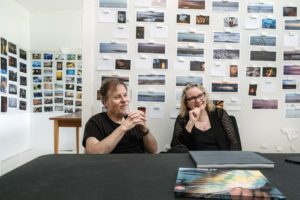
“I picked up my camera,” she says, “and I joined Alex on the other side of the glass.”
She didn’t join Alex Webb physically. Instead, she snapped a photograph of the lamp’s reflection, joining him creatively. That moment was the spark of what became a collaborative photography project, resulting in their recently published book Waves. They call it “a pandemic logbook.”
The project combines Alex’s panoramic photographs of Wellfleet beaches with Rebecca’s more intimate photographs, typically sidelong glimpses of nature framed by their domestic space. Eventually, words did come to Rebecca, who is a poet as well as a photographer. Sparse and impressionistic, the words accompany the images, capturing what she describes as “moments of seeing deeply that keep us afloat during times of uncertainty and loss.”
A sense of quietude is the book’s most pronounced quality. In Newcomb Hollow I, a single wave arches gently from a still ocean, a slight disturbance on a flat, silvery-blue surface. Other images show waves crashing furiously, but the photographs erase sound, reflecting the way many experienced the early days of the pandemic as both dramatic and quiet.
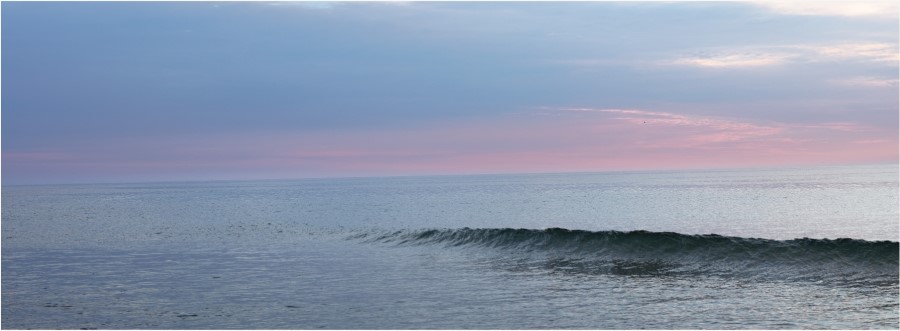
Rebecca describes her husband’s seascapes as “interludes that create the tempo of the book.” Virginia Woolf’s novel Waves inspired the structure. Rebecca discovered an early Hogarth edition of the book in the library of her late father-in-law, the publisher Dwight Webb, who previously owned their modernist Wellfleet home with his wife, artist Nancy Webb. The novel’s lyrical interludes describe the sea at different times of day.
Responding to the motif of a wave in her own manner, Rebecca says, “I started to photograph waves of light as they washed through our home of many windows.” Her photographs tend to favor “the elusive red light at the end of the day”; her gaze, she writes, is “dreamy and somewhat askew, as if I were looking at the world out of the corner of my eye.”
The waves of the pandemic are a troubling undercurrent flowing through the book. Death hangs over some of the images, such as that of a dead seal pup. In the following wintry panorama, dry twigs poke sharply from beneath a snowy bank. A somber, elegiac mood emerges with no obvious storyline.
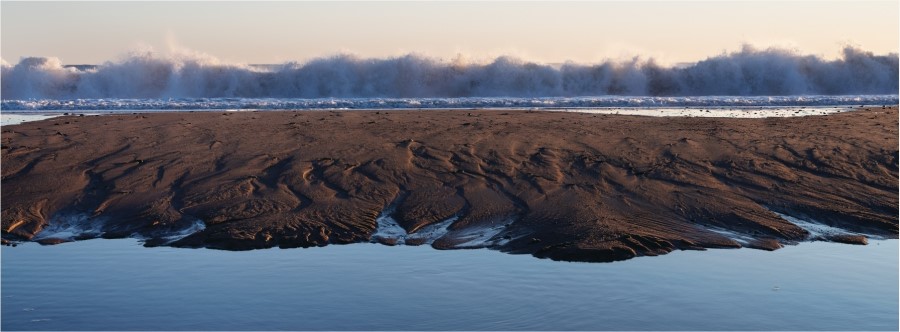
“I love photographs that have slight ambiguity,” says Alex. “The heart of poetry and photography have some similarities. What’s left out is really important. There’s no narrative running through.”
Alex captures ambiguity in some of his photographs by focusing on the dramatic shifts that can occur at low tide, when reflecting pools and snaking rivulets in the sand appear in marked contrast to the expanses of water beyond, an image of two different worlds. “An uncertainty over where you are is consistent and runs through my work,” says Alex.
This project marked a distinct shift for Alex, who is known for his street photography. “I worked in urban spaces with lots of people and lots of activity,” he says. “I thought I wouldn’t photograph this way on the Cape until I was older.” He is 70.
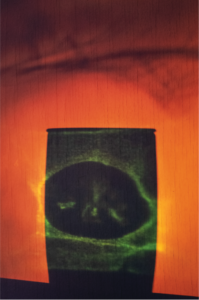
Raised in Cambridge, he summered in Wellfleet as a child with his family. “Whenever I’ve come to Cape Cod, I experience a deep sense of calm,” he says. “I was never able to express it in photos.” He sought out less familiar places, working along the U.S.-Mexico border and in Cuba and Haiti throughout a long career as a Magnum photographer.
When the pandemic hit New York, where the couple also lives, they decamped to Wellfleet. “I started photographing on the beach in a more meditative way, following time and tides and weather,” says Alex. “You do what you can in your circumstances.
“We come together in the editing process,” he continues. “We look at the images and see how they speak together.” This is their sixth collaborative book.
“In all of our work, we feel the world is our collaborator,” says Rebecca.
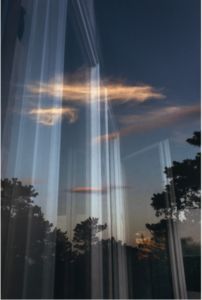
Amid the underlying anxiety are notes of hope in the seasonal rhythm of the book and the repeating images of forsythia. Rebecca says their creative practice has served as a potent source of stability. “Photography became our ship and light, our anchor,” she says. Their book is a beautiful record of that journey.
Together and Apart
The event: The photographs of Alex Webb & Rebecca Norris Webb from Cuba, Cape Cod, and Beyond
The time: Friday, July 8, 5 p.m.
The place: Wellfleet Preservation Hall, 335 Main St.
The cost: Free
